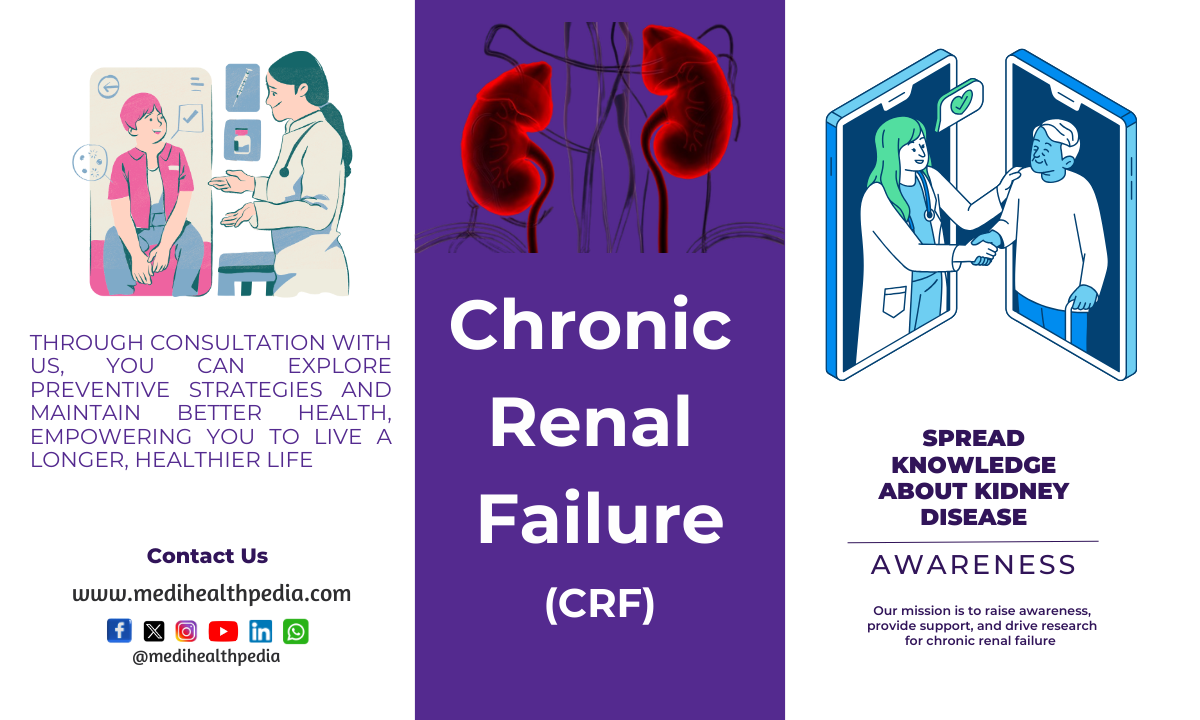Understanding Chronic Renal Failure (CRF): A Comprehensive Clinical Overview of Kidney Diseases & Exploring Natural Remedies
Introduction
Chronic Renal Failure (CRF), also known as chronic kidney disease (CKD), is a multifaceted and often debilitating condition that affects millions of individuals worldwide. The kidneys are essential organs responsible for maintaining the body’s internal balance, filtering waste products, and regulating vital functions. However, when kidney function deteriorates over time, it can lead to a cascade of health issues. In this in-depth article, we will explore the clinical overview of CRF, its clinical presentation, basic investigations, complications, conventional treatment options, preventive measures, herbal remedies for treatment, lifestyle modifications, and conclude with a comprehensive understanding of managing this complex chronic condition.

Clinical Overview of CRF
Chronic Renal Failure represents a gradual and typically irreversible decline in kidney function, often extending over months to years. It is clinically categorized into stages based on the estimated glomerular filtration rate (eGFR), which offers insight into the severity of kidney damage:
- Stage 1: Kidney damage with normal eGFR (≥90 mL/min/1.73 m²).
- Stage 2: Kidney damage with mildly decreased eGFR (60-89 mL/min/1.73 m²).
- Stage 3: Moderately decreased eGFR (30-59 mL/min/1.73 m²).
- Stage 4: Severely decreased eGFR (15-29 mL/min/1.73 m²).
- Stage 5: End Stage Renal Disease (ESRD) with a severely decreased eGFR (<15 mL/min/1.73 m²).
Causes of CRF are varied and may include conditions such as diabetes, hypertension, glomerulonephritis, and polycystic kidney disease. The progression of CRF is typically gradual, offering an opportunity for proactive management aimed at slowing further kidney deterioration.
Clinical Presentation of CRF
The clinical presentation of CRF can manifest in diverse ways, depending on the stage and severity of the condition. Common symptoms and signs of CRF include:
- Fatigue and general weakness
- Edema, or swelling in the legs, ankles, or face
- Elevated blood pressure
- Changes in urine frequency or color
- Anemia, often indicated by a low red blood cell count
- Loss of appetite and unintentional weight loss
- Itching (known as pruritus)
- Nausea and vomiting
- Cognitive changes, such as difficulty concentrating
These symptoms may vary among individuals, and some patients may remain asymptomatic until they reach advanced stages of CRF.
Basic Investigations for CRF
The diagnosis and monitoring of CRF typically involve a combination of clinical assessments and laboratory tests:
- Blood Tests:
- Serum Creatinine: Elevated levels of creatinine in the blood serve as a key indicator of impaired kidney function, as creatinine is a waste product that the kidneys typically filter from the bloodstream.
- Blood Urea Nitrogen (BUN): Elevated BUN levels can suggest kidney dysfunction, although they can also be influenced by factors beyond kidney function.
- Urine Tests:
- Urinalysis: An examination of urine for protein, blood, and other abnormalities can provide critical information about kidney function and the presence of kidney damage.
- Glomerular Filtration Rate (GFR): GFR, calculated based on serum creatinine levels, is a vital parameter that helps determine the stage of CKD.
- Imaging:
- Ultrasound, CT scans, or MRIs may be utilized to assess the size and structure of the kidneys, identify any structural abnormalities, and evaluate the extent of damage.
- Biopsy: In select cases, a kidney biopsy may be warranted to determine the underlying cause of kidney disease and guide treatment decisions.
Complications of CRF
Left untreated or managed ineffectively, CRF can lead to a host of complications and comorbidities, including:
- Cardiovascular disease: CRF significantly raises the risk of heart disease and stroke.
- Anemia: Impaired kidney function can lead to decreased production of erythropoietin, resulting in anemia.
- Bone and mineral disorders: Abnormal levels of calcium and phosphorus can adversely affect bone health.
- Fluid and electrolyte imbalances: Impaired kidney function may lead to fluid retention and electrolyte imbalances.
- Infections: Reduced immune function in individuals with CRF increases the risk of infections.
- Neurological issues: Advanced CKD can lead to conditions like uremic encephalopathy, affecting neurological function.
- Malnutrition: Poor appetite, dietary restrictions, and metabolic changes in CRF can contribute to malnutrition.
- Kidney-related emergencies: Conditions like hyperkalemia, characterized by high potassium levels, can be life-threatening and necessitate immediate intervention.
Conventional Treatment of CRF
Conventional treatment for CRF is multifaceted and aims to slow the progression of kidney damage, alleviate symptoms, and manage associated complications. The following approaches are commonly employed:
- Medications: Physicians may prescribe medications to control underlying conditions contributing to kidney disease, lower blood pressure, treat anemia, and manage other symptoms and complications.
- Diet and Lifestyle Modifications: Lifestyle changes are crucial for managing CRF, including adherence to a low-sodium diet, reducing protein intake, and effectively managing underlying health conditions, such as diabetes and hypertension, to slow the progression of kidney disease.
- Blood Pressure Management: Effective management of blood pressure is essential to preserve kidney function and reduce the risk of complications.
- Dialysis: In advanced stages of CRF, when the kidneys can no longer adequately filter waste and excess fluid from the blood, dialysis may become necessary. Hemodialysis and peritoneal dialysis are two modalities used to perform these essential functions.
- Kidney Transplantation: Kidney transplantation is often the most effective and enduring treatment for advanced CRF, offering improved quality of life and kidney function.
Prevention of CRF
Preventing CRF and delaying its progression involve addressing risk factors and adopting a healthy lifestyle:
- Manage Underlying Health Conditions: Effective management of conditions such as diabetes, hypertension, and autoimmune disorders can help prevent or delay the onset of kidney disease. Regular medical check-ups are essential.
- Maintain a Healthy Diet: A balanced diet with limited salt, saturated fats, and processed foods can support kidney health.
- Hydration: Staying well-hydrated is important, but individuals with CRF may need to manage fluid intake carefully.
- Avoid Nephrotoxic Substances: Minimizing exposure to substances and medications that can harm the kidneys, such as non-steroidal anti-inflammatory drugs (NSAIDs), is crucial.
Herbal Medicines for CRF Treatment
While herbal remedies are not a substitute for conventional medical treatment, some herbs are believed to offer potential benefits for kidney health. Here are a few examples:
- Turmeric (Curcuma longa): Renowned for its anti-inflammatory properties, turmeric may help reduce inflammation in the kidneys.
- Dandelion (Taraxacum officinale): Dandelion root and leaf extracts are thought to have diuretic properties that could support kidney function.
- Chanca Piedra (Phyllanthus niruri): Traditionally used to promote kidney and urinary tract health, Chanca Piedra has garnered attention for its potential benefits.
- Garlic (Allium sativum): Garlic may help reduce blood pressure and is known for its antioxidant properties.
- Astragalus (Astragalus membranaceus): Utilized in traditional Chinese medicine, Astragalus is believed to support kidney health and strengthen the immune system.
It is essential to consult with a healthcare professional before using herbal remedies, as they may interact with medications and require appropriate dosages.
Lifestyle Modification for CRF Management
Adopting a kidney-friendly lifestyle can significantly improve the quality of life for individuals with CRF:
- Hydration: Staying well-hydrated is important, but healthcare providers may recommend fluid restrictions for individuals on dialysis.
- Manage Blood Pressure: Consistently monitor and control blood pressure through diet, exercise, and prescribed medications.
- Diet Control: Reduce sodium, potassium, and phosphorus intake as recommended by a healthcare provider.
- Exercise: Engage in regular, low-impact physical activity to maintain overall health and well-being, taking care to avoid excessive strain on the kidneys.
- Medication Adherence: Follow your prescribed medications and treatment plan carefully, attending regular check-ups and consultations with healthcare professionals.
Conclusion
Chronic Renal Failure (CRF) is a complex and challenging condition that demands meticulous management and comprehensive care. With early detection, medical treatment, and proactive lifestyle modifications, individuals with CRF can lead fulfilling lives and effectively manage their condition. While herbal remedies may offer complementary support, they should always be used under the guidance of healthcare professionals.
Education, awareness, and timely intervention are critical in the management of CRF, and by equipping individuals with the right information and support, they can take control of their health and well-being and look forward to a brighter and healthier future. CRF may present significant challenges, but with the appropriate knowledge and assistance, individuals can navigate this condition and work towards an improved quality of life.

